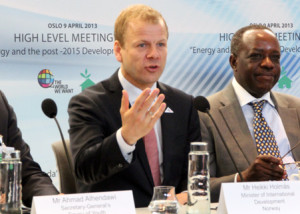Appointments to the governing bodies of the UN’s Sustainable Energy For All (SE4ALL) initiative announced by the Secretary-General on April 19th are unlikely to silence longstanding criticisms of the governance structure.
In a sprawling list of 47 names, only that of Heikki Holmås, the Norwegian Minister of International Development, caught my attention. The American establishment dominance of SE4ALL’s Executive Committee may be disconcerted by the new arrival, described as a former “waste collection worker” and now a driving force of one of the most left-wing parties represented in European government, with form as a critic of US society.

I recognised the name rather more as a minister who has quickly made his mark, having succeeded the long-serving Erik Solheim last year. The speech given by Holmås at last year’s London Summit on Family Planning was one of the best of its type that I’ve heard. And in hosting a high level meeting on Energy and the post-2015 Development Agenda in Oslo earlier this month, he made a serious attempt to transform the tired conference format into something interesting and telegenic (not entirely successfully).
SE4ALL is a bold initiative led by the UN Secretary-General which seeks to force the pace on the scourge of energy poverty. It sets a target to provide universal access to electricity and safe cooking facilities by 2030, alongside further goals relating to global energy efficiency and the use of renewable technologies. This vision is a strong candidate for inclusion in the new range of post-2015 sustainable development goals currently under debate.
Governance criticisms came to a head at last year’s Rio+20 UN Conference on Sustainable Development when SE4ALL featured as the lead case study in the Friends of the Earth investigation, Reclaim the UN from corporate capture. It described the UN’s High-level Group for SE4ALL as “an unaccountable, handpicked group, dominated by representatives of multinational corporations and fossil fuel interests, virtually without any involvement from or consultation with global civil society.” Only 4 of the 35 members of the Group were women.
Ban Ki-moon has responded with a more balanced selection but also by further distancing the high-level group, now called the Advisory Board, from the day-to-day work of the initiative. Co-chaired by Ban himself and Dr Jim Yong Kim, president of the World Bank, this Board has 36 members. It’s difficult to conceive a coordinated role for these senior figures, other than as powerful advocates for the cause.
Attention therefore focuses more on a new inner Executive Committee which will supervise the activities of Kandeh Yumkella, now appointed as the full-time chief executive of the initiative.
This Committee’s profile is unconvincing. Only two of the eleven members are women. The interest of traditional energy corporations continues to be represented by Shell and Eskom. Apart from the Eskom CEO, Africa has no voice, nor does Southeast and East Asia, the world’s most dynamic economic region.
The two representatives of civil society, The Energy and Resources Institute and the World Resources Institute, are organisations renowned for research, rather than the grassroots experience of implementing programmes in poor communities.
The inclusion of Heikki Holmås to this inner group may have been compelled by force of credentials. The Norwegians have been right behind the Secretary-General’s energy initiative from the outset, hosting a pivotal conference in October 2011 at which the prime minister launched Norway’s own programme, the International Energy and Climate Initiative (Energy+).
Energy+ broadly replicates the approach of SE4ALL in pursuing the goal of universal access to energy. Norway’s 2013 aid budget includes a figure approaching $350 million for the Energy+ programme. This is serious and near-term money, unlike the vaguely articulated promises of public-private partnerships that proliferated at the Rio+20 event.
Norway’s Energy+ initiative is important not just for its budget but for its “guiding principles”. These preclude support for new fossil fuel developments, despite Norway’s own ambiguous position as a major oil producer. Referring to the 1.3 billion people without access to electricity in a speech earlier this month, Heikki Holmås said: “the reality of climate change means that this increase in energy production should be in the form of renewable energy.”
This position – which is shared with considerable passion by most environmental NGOs – conflicts with the Rio+20 outcome document and may be at odds with other members of the SE4ALL Executive Committee. The World Bank, represented by Rachel Kyte, in particular has been grappling with the dilemma of financing coal and gas projects for grid extension in poor countries.
Much may depend on the interpersonal dynamics within the new group. I couldn’t help noticing that eight of the eleven members of the Executive Committee either work in the US or possess a higher degree from a US university. Make that nine out of twelve if you include the chief executive, Kandeh Yumkella.
Heikki Holmås did venture into an American university a couple of weeks ago, his speech on inequality to students at New York University amounting to a bold manifesto on the challenge of global poverty.
He also informed the students that: “the American dream is dying in the US, but it is still alive and kicking in Norway.”
Heikki Holmås announces Norway’s commitment to family planning at the 2012 London Summit.
******
UN Secretary-General and World Bank President name Sustainable Energy For All advisory board members
Mini-bios of SE4ALL Executive Board members (scroll to page 13)
Energy+: Questions and Answers from Norwegian Ministry of Foreign Affairs